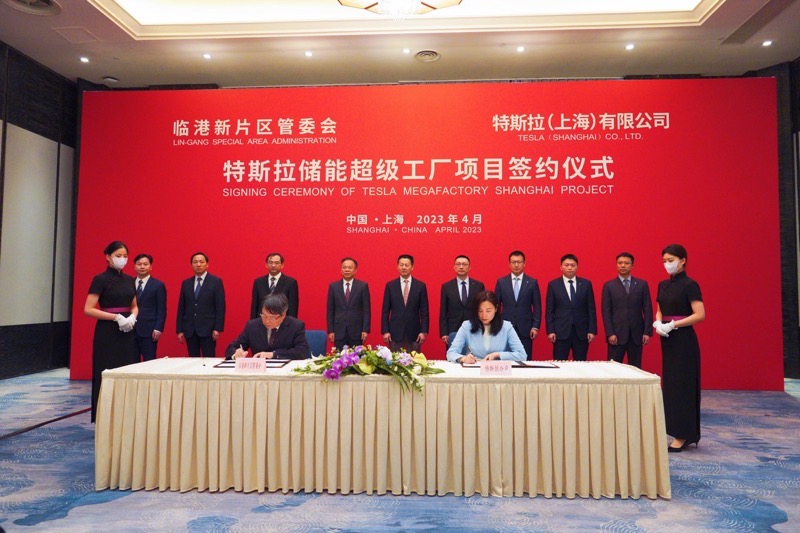Tesla Begins Construction on Megafactory in Shanghai
Tesla has started construction on a new Megafactory in Shanghai on Thursday, marking the company’s first energy storage system factory outside the United States. This facility will produce Tesla’s Megapacks, large-scale energy storage batteries.
Industry observers view the factory as a significant example of industrial and technological cooperation between China and the US. They note that despite rising trade tensions and bilateral discord, US businesses remain pragmatic, valuing the competitiveness of China’s new energy sector. The factory is also seen as a counter to the “overcapacity” narrative promoted by some Western politicians and media, reports the state-owned Global Times.
This project is Tesla’s second major investment in China, following the 2019 opening of its Shanghai Gigafactory, which the company described as “opening a new chapter” in the country. The megafactory announcement came after Tesla CEO Elon Musk’s visit to China on April 28, during which he met with Chinese Premier Li Qiang and expressed Tesla’s commitment to deepening cooperation with China for mutual benefit.
The new factory aims to produce over 10,000 units of large-scale electrochemical commercial energy storage systems annually, with mass production expected to start in the first quarter of 2025.
Following the groundbreaking ceremony, Shanghai Lingang Economic Development Group and Tesla signed a contract for China’s first batch of these energy storage systems, as reported by Xinhua News Agency. The negotiation and signing process took only one month, setting a record for the “Lingang speed.”
The factory will cover approximately 200,000 square meters and involves an investment of about 1.45 billion yuan ($200.21 million). The products will be exported to overseas markets, including the Asia-Pacific region, to support the global “green future,” according to Xinhua.
Despite the US increasing its scrutiny of China’s new energy vehicle (NEV) sector, Tesla’s investment underscores the industry’s confidence in China’s technological advancement and market potential. “China’s market continues to attract foreign investment due to its high-tech advancements and vast opportunities,” said Li Yong, a senior research fellow at the China Association of International Trade.
Li emphasized that Tesla’s decision was influenced by China’s favorable investment environment, growth prospects, and stable supply chain. He noted that China’s advanced energy storage technology and robust supply chain were key factors in Tesla’s choice to establish the factory in Shanghai.
“The rapid progress of various industries in China towards cutting-edge sectors signals great opportunities for foreign companies,” Li added.
Tesla’s Vice President, Tao Lin, stated in the Xinhua report that Tesla’s energy storage business is now as significant as its electric vehicles. She highlighted China’s strong industrial system, market potential, resilient economy, and favorable business environment.
The decision to build the megafactory in Shanghai is also driven by the faster construction speed in China and the global supply constraints related to lithium iron phosphate battery cells. Industry insiders pointed out that China is currently the only country with large-scale production capacity for this essential raw material in energy storage batteries.
Experts believe the new project signifies Tesla’s ongoing investment and cooperation with China, countering claims that foreign investment is withdrawing from the country and challenging the overcapacity narrative in China’s NEV industry.
Chinese officials have reiterated their commitment to opening up the country further. Premier Li Qiang assured Musk that China’s market will remain open to foreign companies. The Ministry of Commerce also stated on Thursday that China will continue to promote high-level opening-up, welcoming foreign investment and creating a fair and predictable environment for businesses.
